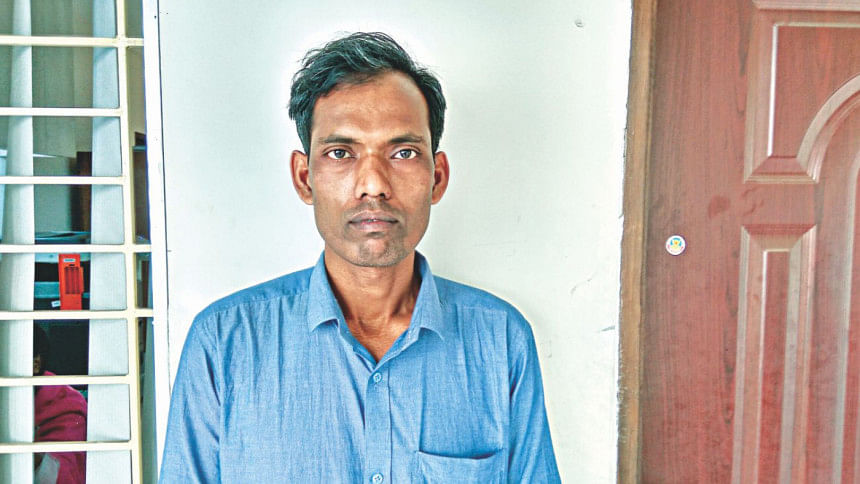Tortured by traffickers

Mercilessly beaten up every day for over four months, he stopped feeling acute pain towards the end and sometimes thought he was dead as Libyan men took turns to hit him.
Abdul Hai, 34, blacked out after a beating on Thursday night. He then woke up to human traffickers splashing water on his face, and heard one of them say, “You are lucky. We will let you go.”
The fortune-seeker, of Kurigram, thinks it was by sheer luck that a member of the trafficking gang that sent him to Libya got arrested in Dhaka. He was brought back from what detectives call a “concentration camp”.
Abdul described his horrifying experiences as he talked to the correspondent yesterday, a day after he returned home.
He had been a migrant worker for most of his adulthood. He came back to the country two years ago after working as carpenter in Singapore for a couple of years.
Several months into living in the village in Rajibpur upazila of Kurigram, “I realised I would have to go abroad again to be able to feed my two children.” One of them is physically challenged.
Abdul then gave his passport and Tk 2 lakh to a manpower broker named Kalam in the village.
About a year later, the broker asked him if he wanted to go to Libya, which would cost him Tk 4 lakh. Abdul then gave him the money from what he had saved while working in Singapore.
“A man called me at night and asked me to come to Dhaka right away to go to Libya. I left home without telling my wife and parents that I was going [to Libya]. I just took a set of clothes in a backpack.”
He flew to Libya on November 8 last year.
On reaching Libya, traffickers seized his passport and drove him straight to a desert where he was confined to a tin-roofed structure.
“There was no window. The room was about 250feet in length, looked like a warehouse.”
There was another 15-20 Bangladeshis. The traffickers began beating him the next day and asked him to call home and tell the family to give Harun, a member of the gang in Dhaka, money for his release.
There was a Bangladeshi named Ismail in Libya. Ismail beat up Abdul and made him talk to Harun and his family members.
“Sometimes when I told them that my family was broke they said they would behead me unless they got some cash.”
“There was a small room inside. It was like a jail within a jail. They put me and four other Bangladeshis in that room. They beat us up and made us call home for money,” Abdul said.
The traffickers, including Libyans, became increasingly cruel as weeks went by. “There was almost no food: just some boiled potatoes, chilies and salt. I began to stink after weeks without shower. They just gave a large bottle of water for five of us.”
“I was knocked out by beatings last Thursday night. Ismail came and woke me up splashing water on my face and said, 'We'll send you home. You got lucky'.”
POLICE'S ROLE IN BRINGING HIM BACK
Harun, one of the gang members behind sending Abdul to Libya, used to contact his family frequently for money. At one point, Harun settled for Tk 4 lakh for Abdul's release.
Harun was recently arrested in a case. Police then came to know about Abdul and the way Harun had blackmailed his family as they answered a call on Harun's phone, said Shahidullah, deputy commissioner of the Detective Branch of police.
Law enforcers then forced Harun to call his gang members in Libya and ask them to send Abdul back.
“We learnt that there are at least 20 more Bangladeshis trapped in the Libyan desert. I hope we will be able to rescue more of them,” the DB official said.

 For all latest news, follow The Daily Star's Google News channel.
For all latest news, follow The Daily Star's Google News channel. 



Comments